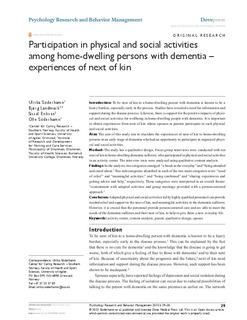| dc.contributor.author | Söderhamn, Ulrika | |
| dc.contributor.author | Landmark, Bjørg | |
| dc.contributor.author | Eriksen, Sissel | |
| dc.contributor.author | Söderhamn, Olle | |
| dc.date.accessioned | 2013-07-02T08:57:11Z | |
| dc.date.available | 2013-07-02T08:57:11Z | |
| dc.date.issued | 2013 | |
| dc.identifier.citation | Söderhamn, U., Landmark, B., Eriksen, S., & Söderhamn, O. (2013). Participation in physical and social activities among home-dwelling persons with dementia – experiences of next of kin Psychology Research and Behavior Management, 6, 29-36. doi: 10.2147/PRBM.S46334 | no_NO |
| dc.identifier.issn | 1179-1578 | |
| dc.identifier.uri | http://hdl.handle.net/11250/138715 | |
| dc.description | Published version of an article in the journal: Psychology Research and Behavior Management. Also available from the publisher at: http://dx.doi.org/10.2147/PRBM.S46334 Open access | no_NO |
| dc.description.abstract | Introduction: To be next of kin to a home-dwelling person with dementia is known to be a heavy burden, especially early in the process. Studies have revealed a need for information and support during the disease process. Likewise, there is support for the positive impacts of physical and social activities for wellbeing in home-dwelling people with dementia. It is important to obtain experiences from next of kin whose spouses or parents participate in such physical and social activities.
Aim: The aim of this study was to elucidate the experiences of next of kin to home-dwelling persons in an early stage of dementia who had an opportunity to participate in organized physical and social activities.
Method: The study has a qualitative design. Focus group interviews were conducted with ten next of kin to home-dwelling dementia sufferers, who participated in physical and social activities in an activity center. The interview texts were analyzed using qualitative content analysis.
Findings: In the analysis, two categories emerged: "a break in the everyday" and "being attended and cared about." Two sub-categories identified in each of the two main categories were: "need of relief" and "meaningful activities;" and "being confirmed" and "sharing experiences and getting advice and help," respectively. These categories were interpreted in an overall theme: "contentment with adapted activities and group meetings provided with a person-centered approach."
Conclusion: Adapted physical and social activities led by highly qualified personnel can provide needed relief and support to the next of kin, and meaningful activities to the dementia sufferers. However, it is crucial that the personnel provide person-centered care and are able to meet the needs of the dementia sufferers and their next of kin, to help to give them a new everyday life. | no_NO |
| dc.language.iso | eng | no_NO |
| dc.publisher | Dovepress | no_NO |
| dc.subject | activity center | no_NO |
| dc.subject | content analysis | no_NO |
| dc.subject | parent | no_NO |
| dc.subject | qualitative design | no_NO |
| dc.subject | spouse | no_NO |
| dc.title | Participation in physical and social activities among home-dwelling persons with dementia – experiences of next of kin | no_NO |
| dc.type | Journal article | no_NO |
| dc.type | Peer reviewed | no_NO |
| dc.subject.nsi | VDP::Medical disciplines: 700::Health sciences: 800 | no_NO |
| dc.source.pagenumber | 29-36 | no_NO |
| dc.source.volume | 6 | no_NO |
| dc.source.journal | Psychology Research and Behavior Management | no_NO |
| dc.identifier.doi | 10.2147/PRBM.S46334 | |
